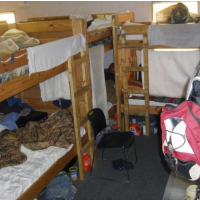Indian Guest Workers’ Rights Get Boost With $20 Million U.S. Settlement
 The cramped quarters of Indian guest workers in Mississippi (photo: Reuters/SPLC)
The cramped quarters of Indian guest workers in Mississippi (photo: Reuters/SPLC)
Indian guest workers are in demand at construction sites across the world, from the Middle East to the U.S. But they often exploited by their employers and have to make do with poor living standards. This could change with the $20 million settlement that 200 Indian workers have received from a U.S. company that defrauded and exploited them.
The workers were brought to the U.S. in 2006 by marine services firm Signal International to repair damaged oil rigs after Hurricane Katrina.
They were welders, pipefitters and electricians, mostly from Kerala. With recruiters promising them jobs and permanent US residency, the workers sold off their property in India to allegedly pay between Rs. 5 lakhs ($10,000) and Rs. 10 lakhs ($20,000) each to land these jobs.
However, when they reached Signal’s shipyards in Pascagoula, Mississippi, the workers discovered that not only were their H-2B guest worker visas meant for temporary non-agricultural workers and would not lead to a green card, but they would also be working in slave conditions.
Signal packed the Indian workers 24 to a trailer in "isolated, guarded labour camps", and extracted $35 a day from each for accommodation. None of the firm’s non-Indian workers were required to live in the company housing.
According to the Times of India, when the workers complained about the conditions and of being exploited, they were illegally detained. They were allegedly threatened with lawsuits and deportation, testing the fears of men who had already given up everything in India to come to U.S. The situation was so dire that one worker reportedly attempted suicide.
The nine-year ordeal of the workers to get justice ended this week when they accepted a $20 million deal to settle their lawsuits. In February, Signal had already been found liable by a federal jury in New Orleans of labour trafficking, fraud, racketeering and discrimination, with $14 million in damages awarded to five Indian guest workers. The case was the first of the dozen lawsuits against Signal to go to trial, making this one of the largest labour trafficking cases in US history.
The lawsuits were coordinated by civil rights group The Southern Poverty Law Center (SPLC), which intervened in 2008 at the request of the workers.
The whole issue has been watched closely by rights' groups because it involves foreign guest workers who are often exploited because they have little resources and recourse to justice. Under U.S. immigration law, H-2B visa holders are prohibited from switching employment and must leave the country if they lose their jobs.
This puts immense pressure on H-2B visa holders to tolerate harsh working conditions. According to the SPLC, guest workers are routinely subjected to human trafficking, cheated out of wages, and held virtually captive by employers or brokers who seize their documents.
This “watershed” judgement could set a precedent in the U.S. as well as in other countries where guest workers face the same conditions.
"They persevered and won justice. This agreement sends a powerful message that guest workers have rights and cannot be exploited," said Alan Howard, SPLC board chairman.
- Karan Singh
To Learn More:
India workers win $20m US settlement (BBC News)
'Enslaved' Indians win $20m in US (by Chidanand Rajghatta, Times of India)
Alabama Company Admits Locking Katrina Workers in Squalid Camps, Settles for $20 Million (Beth Ethier, Slate)
'Watershed' Indian Guest Worker Lawsuit Costs Alabama Company $20 Million (by Angelo Young, International Business Times)
Close to Slavery: Guestworker Programs in the United States (Southern Poverty Law Center)
- Top Stories
- Controversies
- Where is the Money Going?
- India and the World
- Appointments and Resignations
- Unusual News
- Latest News
- India College Chain’s Expansion into U.S. Draws Opposition from Massachusetts Officials over Quality of Education
- Milk Shortages in India Tied to Release of New Movies Featuring Nation’s Favorite Stars
- Confusion Swirls around Kashmir Newspaper Ban in Wake of Violent Street Protests
- Polio-Free for 5 Years, India Launches Vaccine Drive after Polio Strain Discovery
- New Aviation Policy Could Increase Service, Lower Ticket Prices






Comments